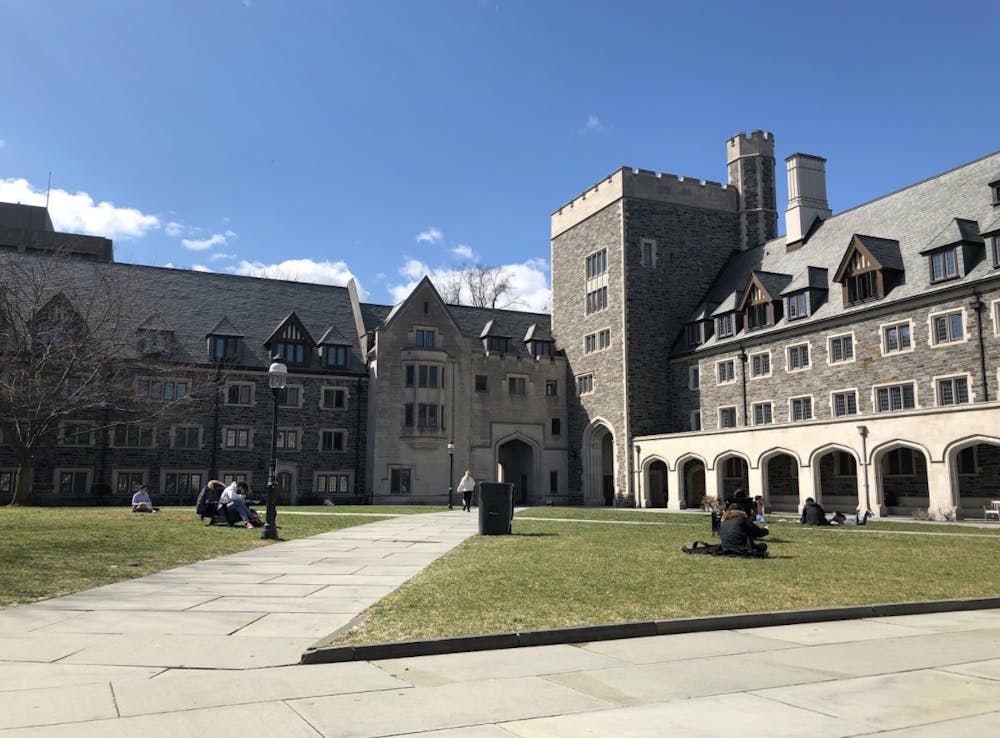A recent update to the University’s social distancing policy bans students still on campus from visiting each other’s dorm rooms. Some fear the stringent punishments described in this policy may leave students in danger of housing insecurity.
While the University required the majority of students to leave campus by March 19 to reduce population density, Nassau Hall made some exceptions and allowed just under 500 undergraduates to remain through the end of the semester. A new policy, announced on March 21, prohibits these students from allowing visitors to enter their rooms and bans all “non-essential” indoor gatherings to reduce community spread.
“We implore students remaining on campus to understand their actions can impact the health of others, including their peers and staff,” wrote Deputy Spokesperson Mike Hotchkiss in an email to The Daily Princetonian.
Vice President for Campus Life Rochelle Calhoun announced that dorm room visitors would not be permitted in an email to students on campus.
“Your ability to remain in residence is contingent upon your willingness to abide by this restriction,” she wrote.
Additionally, Calhoun continued, students who offer overnight accommodations to any guests “will be asked to leave campus immediately.”
An undergraduate FAQ page clarifies that this policy includes visits from other students approved to stay on campus.
The updated protocols went into effect at 9:00 pm on March 21, less than three hours after students received the notice. They came in response to New Jersey Governor Phil Murphy’s “stay-at-home” order, which went into effect at the same time.

Under the executive order, all New Jersey residents must remain in their homes, with a few exceptions for people to purchase necessary household items and for essential employees to travel to work.
Unlike University policy, the New Jersey order includes an exception for “visiting family or other individuals with whom the resident has a close personal relationship, such as those for whom the individual is a caretaker or romantic partner.”
“Living in a dormitory presents particular challenges for keeping people healthy because of the close proximity and shared spaces,” wrote Deputy University Spokesperson Mike Hotchkiss in a statement to The Daily Princetonian. “Governor Murphy’s provision regarding family visitation, particularly to care for or provide support to other family members, is not an appropriate analogy for our campus.”
Additionally, while the new protocol prohibits all non-essential indoor gatherings, some students feel they fail to set clear expectations for on-campus students.

“They never really go into detail about what non-essential means,” said Enrique Zúñiga González ’22 of the University’s policy.
Given the severe consequences for violating social distancing protocol, the announcement has led to confusion and rising anxieties among some undergraduates. For students who have nowhere to go if asked to leave campus, the punishments outlined in the new policy have made them fear for their safety.
“I feel like the part that’s unfair about the policy is the punishment because they’re threatening you with homelessness,” Zúñiga González said.
Among the students approved for on-campus housing are those from CDC Level 3 Warning countries and those with extreme financial or housing insecurity because of their inability to safely return home.
On Saturday, March 21, graduate students received a similar email from Calhoun, explaining that the new policy prohibits visitors from entering student housing and limits research activities to essential personnel.
Unlike the email sent to undergraduates, the message to graduate students did not mention disciplinary consequences for violating the new protocol.
In spite of enforcement concerns, several undergraduates interviewed by the ‘Prince’ noted that the latest update to University policy is reasonable in its commitment to social distancing, which is widely regarded as essential to slowing the spread of COVID-19.
Prior to the policy update, students had already been required to adhere to social distancing protocol, which includes a ban on large gatherings. As a result, some students felt that the new policy made little substantive change to their daily routine on the mostly empty campus.
“We were basically already doing this,” said Vydhourie Thiyageswaran ’21 of the updated protocol.
But others noticed a sharp drop in activity around campus the day after the policy was put in place, as former gathering spots lay empty and friends canceled plans to meet up. Several felt that the most recent policy took a firmer tone in communicating the importance of social distancing.
“People are taking the situation more seriously now,” said Cataleya Jiang ’23.
Some students who broadly agree with the University’s response, however, expressed concern about the threat to immediately remove students who violate the updated protocol.
Jiang said that she generally approves of the steps the University has taken to preempt a COVID-19 outbreak on campus. She added, though, that if the University enforces the new protocol, it should also find ways to resolve housing insecurity.
“They have pushed out the punishment, but now they need to push out a resolution to those problems,” she said.
Though Hotchkiss did not directly address questions about how the University would support students asked to leave campus, he emphasized the policy’s importance, in light of earlier reports of students disregarding social distancing policies.
He added that students agreed to social distancing protocol as a condition for remaining on campus.
“We are serious about the consequences [for] disregard of these conditions,” he wrote.








